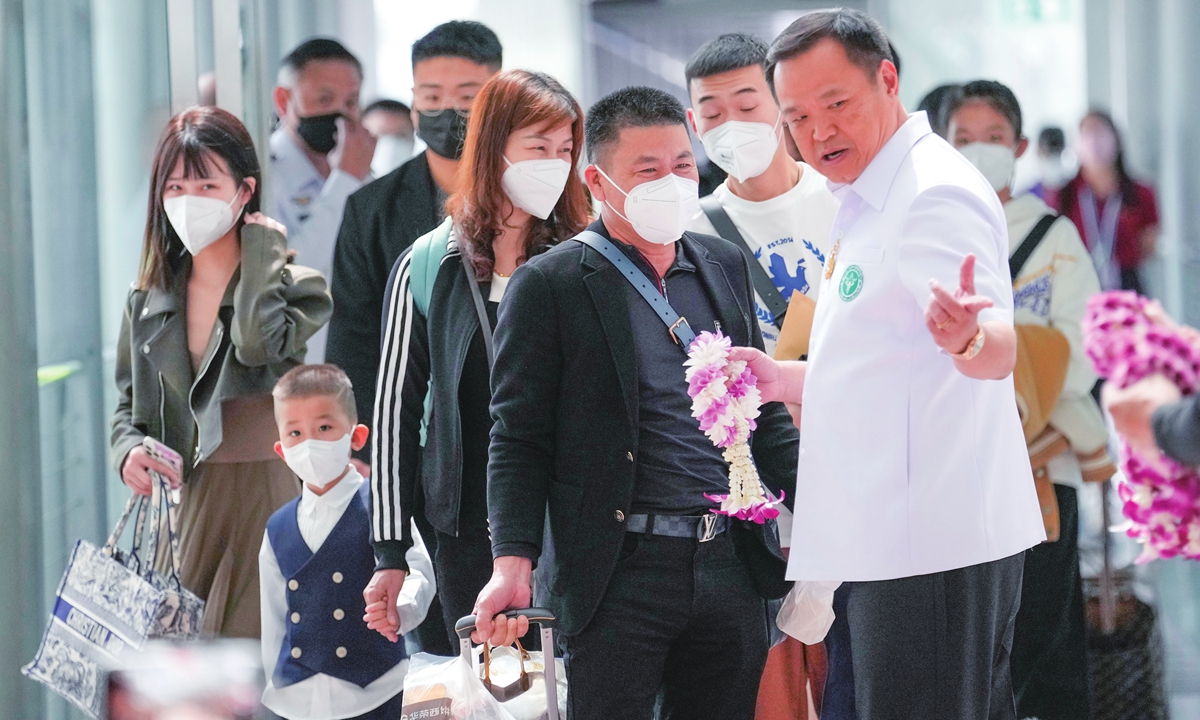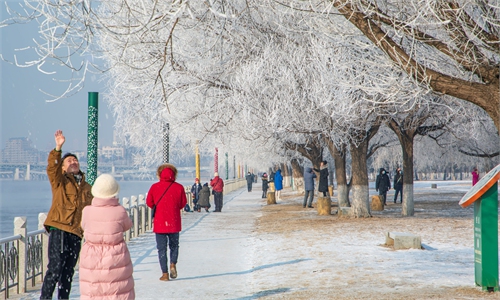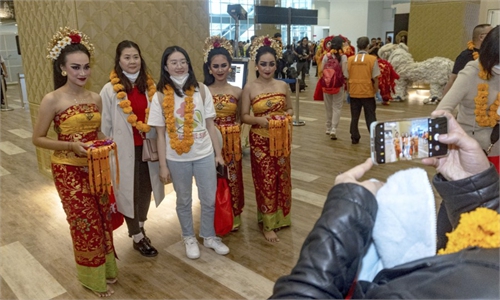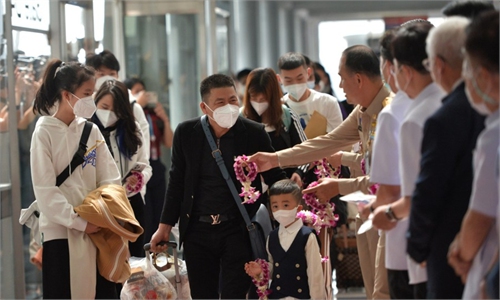France, South Korea to miss out on tourism dividend for extended restrictions on arrivals from China
Chinese travelers to unleash a massive demand in Feb: agency

Thailand's Public Health Minister Anutin Charnvirakul (right) hands garlands to Chinese tourists on their arrival at Suvarnabhumi International Airport in Samut Prakarn province, Thailand on January 9, 2023. Thailand is looking forward to hosting large numbers of visitors from China again after it downgraded its COVID-19 prevention and control measures and eased travel restrictions. Photo: VCG
China announced on Sunday plans to resume issuing visas to Japanese tourists from that day, which followed a tourism boom during the just-ended Chinese Lunar New Year holidays, and it is regarded as a positive sign for travel and communications between Chinese and Japanese people.
China will resume issuing visas to Japanese tourists starting from Sunday, said the Chinese Embassy in Japan.
"As the Japanese Embassy in China resumed visas for Chinese nationals, the immigration agencies now resume visa applications for Japanese travelers. The 72/144-hour visa-free transit policy will be reinstated," the Chinese National Immigration Administration also said on Sunday.
Japan is one of the first countries that imposed entry restrictions on Chinese tourists after China downgraded its COVID-19 response on January 8, but it quickly changed its policy since its domestic tourism and related industries suffered harshly due to its wrong move of imposing restrictions on travelers from China.
In contrast to the positive development between China and Japan, other countries imposing restrictions on China like France and South Korea have slapped fresh travel restrictions on visitors from China, although China is ready to resume outbound group tours in February.
France has extended mandatory COVID-19 tests for travelers from China until February 15, Reuters reported on Saturday, citing a government decree. Reuters said the move came as experts warned about the so-called possibility of a rise in COVID-19 cases in Chinese rural areas that are less equipped to deal with them as millions of Chinese people travel for family reunions during the Chinese Lunar New Year holidays.
South Korea said it will continue to restrict the entry of short-term travelers from China through the end of February over concerns that the spread of COVID-19 in China may worsen following the Chinese Lunar New Year holidays, media reported on Friday. South Korea in early January stopped issuing most short-term visas at its consulates in China.
China's Ministry of Foreign Affairs slammed the moves of these countries as not fact- or science-based. COVID-19 response measures should not be used for political manipulation and there should not be any discriminatory measures, they noted.
Facts prove that China witnessed a warm and joyful Spring Festival holiday with its airports, bus terminals and train stations crowded and migrants reuniting with their family members, unlike what some Western media outlets speculated - that the country would experience tsunami-like infections following the Spring Festival travel rush.
A Chinese Center for Disease Control and Prevention (China CDC) report released on Saturday said the number of positive tests reached a peak on December 22, 2022 with 6.94 million, and dropped to a low of 15,000 on January 23, citing reported nucleic acid test results reported by nationwide provincial authorities.
Industry observers warned that the extended restrictions of France and South Korea are also likely to make those countries miss the tourism dividend brought by massive pent-up demand for international travel from Chinese travelers, when many countries are yearning for economic growth with the contribution of Chinese tourists in the post-epidemic era.
When countries like France and South Korea shut their doors to Chinese arrivals citing unnecessary infection concerns, South Asian countries have received tens of thousands of Chinese travelers, becoming the biggest winner of Chinese "revenge travel" in the first Spring Festival holidays, the most important Chinese traditional festival, since the country scrapped quarantine mandatory rules.
Many Southeast Asian countries announced they would not add new entry restrictions specifically targeting Chinese tourists ahead of the holidays, and they even welcomed Chinese travelers with flowers and opened up new amusement projects to lure tourists from China.
Overall outbound travel orders during the Spring Festival holidays increased by 640 percent year-on-year, and cross-border air ticket orders increased by more than four times. Bangkok, Singapore, Kuala Lumpur, Chiang Mai, Manila and Bali were the most popular destinations for Chinese tourists. All those cities are in Southeast Asia, according to the 2023 Spring Festival travel summary report released by travel platform Ctrip.
The travel spree during Spring Festival is just a warm-up, as the travel rebound after the restart of group tours in February will be the highlight of the industry as China's tourists will unleash a massive demand for international travel afterward, an employee from a Shanghai-based travel agency surnamed Zhang told the Global Times.
China's outbound group tours to 20 countries and regions will be resumed starting February 6, according to the Ministry of Culture and Tourism. Southeast Asian countries such as Thailand, Indonesia, Malaysia, Singapore and the Philippines, as well as the Maldives, the United Arab Emirates, Egypt, Switzerland and New Zealand are among the list.
Zhang said his travel agency has created many itineraries to meet potential demand for international travel to 20 destinations listed by the ministry. Tourists will first of all choose to visit these countries, especially nearby countries that accept visa applications and are friendly to Chinese arrivals.
The first wave of the dividend coming from the tourism boom during the Spring Festival holiday benefited South Asian countries.
Countries such as South Korea that imposed restrictions on Chinese tourists are likely to see the return of Chinese travelers at a slow pace after scrapping their travel restrictions on travelers from China, Zhang noted.
From an economic point of view, China, as the world's second-largest economy, is an important engine for global economic growth. Epidemic restrictions announced by some countries on Chinese travelers will hinder China's ability to unleash its consumption potential in the global market, Gao Lingyun, a research fellow from the Institute of World Economics and Politics, Chinese Academy of Social Sciences, told the Global Times.
Industry observers believe that the tourism market in China will enter the "fast track" in the first half of 2023 following the resumption of more overseas flights and further reopening of travel destinations.



